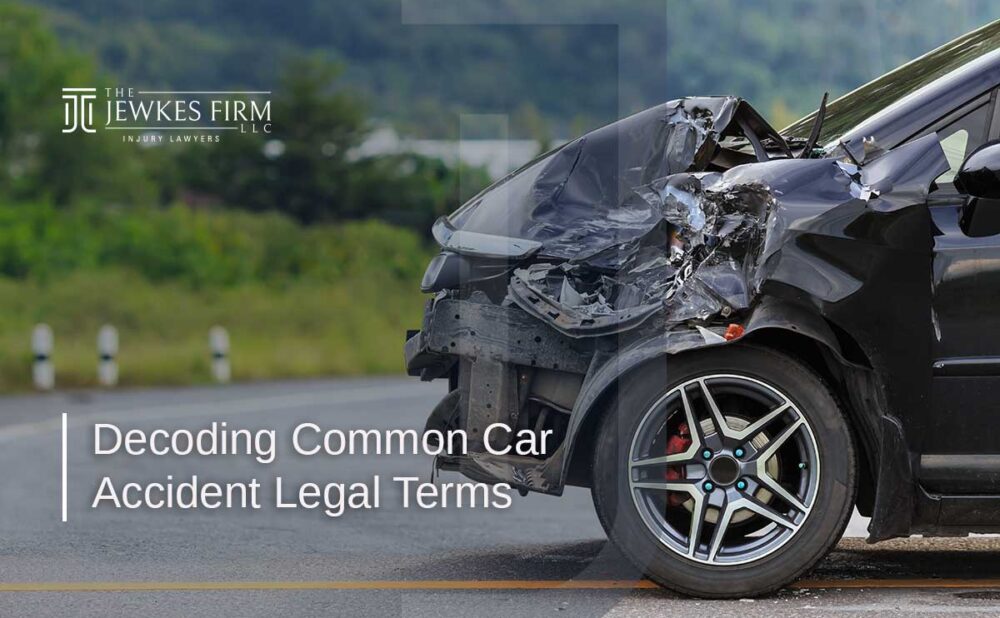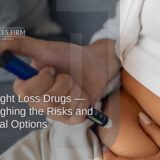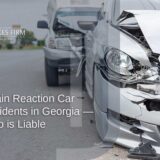Decoding Common Car Accident Legal Terms Every Victim in Atlanta Should Understand
Car accidents are unexpected events that can leave victims dealing with physical, emotional, and financial struggles. When you’ve just been in a car accident, you’re dealing with enough—medical bills, insurance adjusters, vehicle repairs, and often pain and trauma. The last thing you need is a maze of legal terms that leave you more confused than before. Georgia’s legal landscape, combined with the state’s traffic statistics, underscores the importance of being informed. At The Jewkes Firm, we believe every accident victim deserves to understand their rights and options clearly. That’s why we’ve broken down the most common car accident legal terms you’ll encounter, along with important steps to take after an accident in the Atlanta area.
Car Accident Statistics in Georgia — A Snapshot
Georgia consistently ranks as one of the states with the highest rates of motor vehicle fatalities. The state has a fatality rate of 1.41 deaths per 100 million miles traveled, which is higher than the national average. In 2023, Georgia reported 1,786 accident fatalities, marking a 3.2% increase over the previous year. Of those, a significant number occurred in Metro Atlanta. The city’s high population density and busy traffic corridors mean that accidents are unfortunately common. Specifically, in 2023, the Atlanta Police Department reported 28,278 car accidents, a slight decline from 29,938 in 2022. However, the severity of these accidents remains a concern, with 71 traffic-related fatalities in the city during the same year.
Despite some progress in traffic safety measures, the number of accidents and fatalities continues to highlight the need for awareness and preparedness. If you or a loved one gets hurt in a car accident, knowing your legal rights is crucial in pursuing compensation for your damages.
Injured In A Car Wreck? Contact Us For A Free Consultation
Injured In A Car Wreck?

Key Legal Terms for Accident Victims
Navigating the aftermath of a car accident can be overwhelming, but understanding the legal jargon can make the process much clearer. Whether you’re speaking with an attorney, negotiating with an insurer, or preparing to file a lawsuit, these terms can help you feel more empowered and informed throughout your case. Here are some important terms to be aware of:
Personal Injury
Personal Injury is a legal term for any physical, emotional, or psychological injury suffered by an individual due to someone else’s negligence. If you’re hurt in a car accident caused by another driver, you may recover personal injury compensation for medical expenses, lost wages, pain and suffering, and more.
At-Fault vs No-Fault States
Georgia is an at-fault state, meaning the driver responsible for the accident is liable for damages. This situation differs from no-fault insurance states, where drivers’ insurance policies cover their own injuries regardless of who is at fault in an accident.
Negligence
Negligence plays a crucial role in personal injury law; it is defined as the failure to act with reasonable care, leading to harm to another individual. Most car accident claims are due to negligence. Proving the other driver acted negligently—by texting while driving, speeding, or ignoring traffic signs—can be key to winning your case. Common examples of negligence include running red lights, distracted driving, or driving while impaired by drugs or alcohol. In Georgia, proving that the other driver was negligent is essential in securing compensation for your damages.
Liability
Liability is the legal responsibility for causing harm or injury. In Georgia, proving the other driver’s liability is crucial for seeking compensation. If the other driver was negligent—whether through distracted driving, speeding, or driving under the influence—they may be held liable for your injuries and damages. Liability may rest with the other driver, multiple parties, or in rare cases, a manufacturer or municipality.
Comparative Fault (Comparative Negligence)
Comparative fault, also known as comparative negligence, is a legal principle in Georgia that allows a car accident victim to recover damages even if they are partially at fault—so long as they are less than 50% at fault. If you’re found to be 20% at fault, your compensation will be reduced by 20%. Understanding this can make a huge difference in settlement negotiations.
Damages
Damages refer to the monetary compensation awarded to a victim for losses incurred due to an accident. The primary types of damages available in Georgia are:
- Economic Damages. Cover tangible, quantifiable losses like medical expenses, lost income, property damage.
- Non-Economic Damages. Address intangible, subjective losses such as pain and suffering, emotional distress, loss of enjoyment of life.
- Punitive Damages. Awarded in rare cases of gross negligence or intentional harm to punish the wrongdoer and deter future misconduct (e.g., drunk driving).
Understanding the types of damages available can help you pursue a fair settlement.
Statute of Limitations
In Georgia, the statute of limitations for personal injury claims resulting from car accidents is two years from the date of the accident. Missing this deadline may prevent you from recovering any compensation.
Insurance Adjuster
An insurance adjuster is a representative from the insurance company who evaluates claims and attempts to settle them. While they may seem friendly, adjusters work for the insurance company—not you. Their goal is to minimize payouts. Always be cautious in what you say and never sign anything without legal advice.
Settlement
A settlement is a formal resolution where the injured party agrees to accept compensation without going to trial. Many cases settle out of court. But not all settlement offers are fair. Settlements cover medical expenses, lost income, emotional trauma, and other damages. It’s important to consult with an attorney before accepting a settlement offer, as it may not fully cover your long-term needs. At The Jewkes Firm, we negotiate aggressively to ensure clients receive maximum value—not just a quick payout.
Demand Letter
A demand letter serves as a formal written request from your attorney to the insurance company outlining your injuries, losses, and the compensation you seek. It’s often the first formal step in the negotiation process. A strong demand letter can set the tone for your entire case.
Litigation
Litigation involves initiating legal proceedings within the court system. If we can’t reach a fair settlement, Attorney Jordan Jewkes is fully prepared to litigate your case and fight for your rights in court. Not all attorneys are trial-ready—we are.
Contingency Fee
A contingency fee is a payment arrangement where your attorney is only paid if your case is successful. The Jewkes Firm, LLC operates on a contingency fee basis. That means no upfront fees, no hourly billing—you don’t pay unless we win for you.
Medical Lien
A medical lien is a legal claim against a settlement or judgment to secure payment for medical services provided to the injured party. If you receive treatment for your injuries, healthcare providers may place a lien on your settlement to ensure they get paid. Understanding how liens work can help you avoid surprises when your case concludes. We help clients negotiate and resolve liens to keep more of their settlement.
Pre-Existing Condition
A pre-existing condition is a medical issue you had before the accident. Insurance companies may try to use pre-existing conditions to deny or reduce claims. However, if your accident exacerbated a prior condition, you’re still entitled to compensation. This is where skilled legal advocacy becomes crucial.
Pain and Suffering
Pain and suffering refer to the physical and emotional distress experienced due to an accident. This can include chronic pain, anxiety, depression, and loss of enjoyment in life. This is a subjective but vital part of your claim. We work with medical experts, therapists, and your personal testimony to build a compelling case for these non-economic damages. Calculating pain and suffering damages can be complex, and having an experienced attorney can help you accurately assess these losses.
Insurance Terms
- Personal Injury Protection (PIP) and MedPay. Optional insurance coverage that pays for your medical bills regardless of fault. Georgia is a fault-based state, so you do not need PIP. However, Medical Payments Coverage (MedPay) can provide valuable financial support in the aftermath of a car accident.
- UM/UIM (Uninsured/Underinsured Motorist). Provides coverage if the at-fault driver lacks sufficient insurance.
- Collision Coverage. Pays for repairs or replacement of your vehicle, irrespective of who was at fault.

The Right Steps After a Car Accident in Atlanta
Knowing the right steps to take immediately after an accident can have a significant impact on your ability to recover damages. Here’s what you should do:
- Seek Medical Attention. Even if you don’t think you’re injured, it’s essential to see a doctor after an accident. Some injuries, like whiplash or concussions, may not show symptoms immediately. A medical professional can assess your condition and help document your injuries for future legal claims.
- Report the Accident. In Georgia, you must report an accident if there is property damage, injury, or death. The police will create an accident report that serves as evidence in your case. Ensure you get a copy of this report.
- Gather Evidence. Take photographs of the accident scene, any injuries sustained, and damage inflicted on your vehicle. Collect the names and contact information of any witnesses. If possible, get a copy of the police report, as it will be vital for your claim.
- Contact an Experienced Personal Injury Attorney. At The Jewkes Firm, we understand the complexities of personal injury claims. Our team of skilled attorneys can guide you through the legal process, help you understand your options, and work diligently to ensure you receive fair compensation for your injuries and damages.
Why Choose The Jewkes Firm?
At The Jewkes Law Firm, we believe that accident victims deserve compassionate and aggressive legal representation. With years of experience handling personal injury cases, we have the knowledge and dedication to fight for your rights.
Here’s what sets us apart:
- Personalized Service. We take the time to understand your individual circumstances and customize our approach based on your specific needs.
- Proven Results. Our firm has a history of successfully securing compensation for accident victims.
- No Fees Unless We Win. We operate on a contingency fee basis, meaning you don’t pay unless we recover compensation for you.

GEORGIA PERSONAL INJURY LAWYER NEAR ME
Final Thoughts from The Jewkes Firm
Car accidents can have life-altering consequences, but you don’t have to face the aftermath alone. Understanding these legal terms and processes is vital for anyone involved in a car accident in Atlanta. Given Georgia’s high traffic-related fatality rates, being informed can make a significant difference in the outcome of your case.
At The Jewkes Firm, we believe in clear communication, fierce advocacy, and putting your recovery first. Hurt in a car accident? Don’t wait. Call Attorney Jordan Jewkes today at (770) 771-5130 for a free, no-obligation consultation.
Local Resources in Atlanta
- Georgia Governor’s Office of Highway Safety. Provides traffic data and safety resources.
- Georgia Department of Transportation (GDOT) Crash Data Dashboard. Offers detailed crash statistics and reports.
- Atlanta Police Department. For filing reports and obtaining accident records.
Frequently Asked Questions
What is the most important legal term to understand after a car accident in Georgia?
Liability is one of the most important terms. It refers to who is legally responsible for the accident—and ultimately who pays for damages.
What is Georgia’s rule on shared fault in car accidents?
Georgia follows a modified comparative fault rule. You can recover damages if you are less than 50% at fault. However, the amount received is lowered based on how much you are at fault.
What is negligence in a car accident case?
Negligence refers to the lack of reasonable care that results in harm to others. In car accidents, it often involves actions like distracted driving or speeding.
Should I speak to the other driver's insurance adjuster?
No. It’s best to speak to an attorney first. Insurance adjusters work for the company—not you—and may try to get you to settle for less.
What are economic and non-economic damages?
Economic damages are quantifiable losses like medical bills and lost wages, while non-economic damages refer to subjective losses such as pain and suffering.
What is Personal Injury Protection (PIP)?
PIP is insurance coverage that pays for medical expenses and lost wages regardless of fault in an accident. While not mandatory in Georgia, it can provide valuable financial support.
How much does it cost to hire The Jewkes Firm?
We work on a contingency fee basis, meaning you don’t pay anything unless we win your case.





